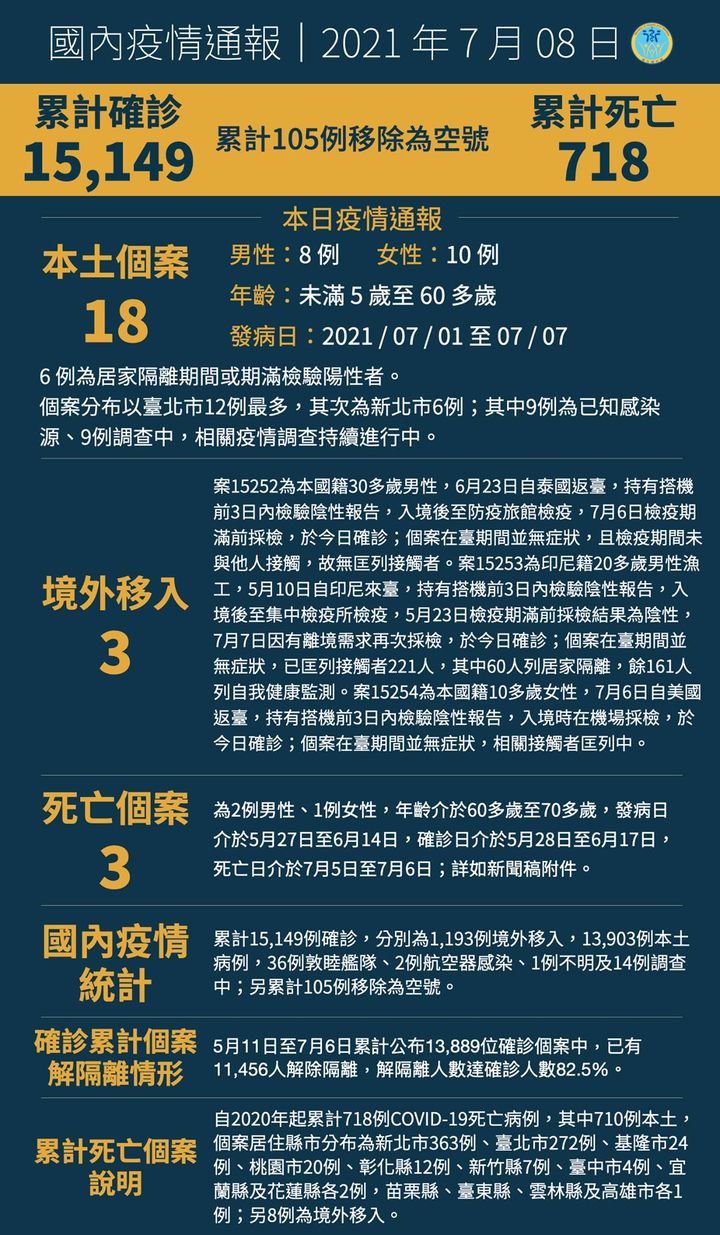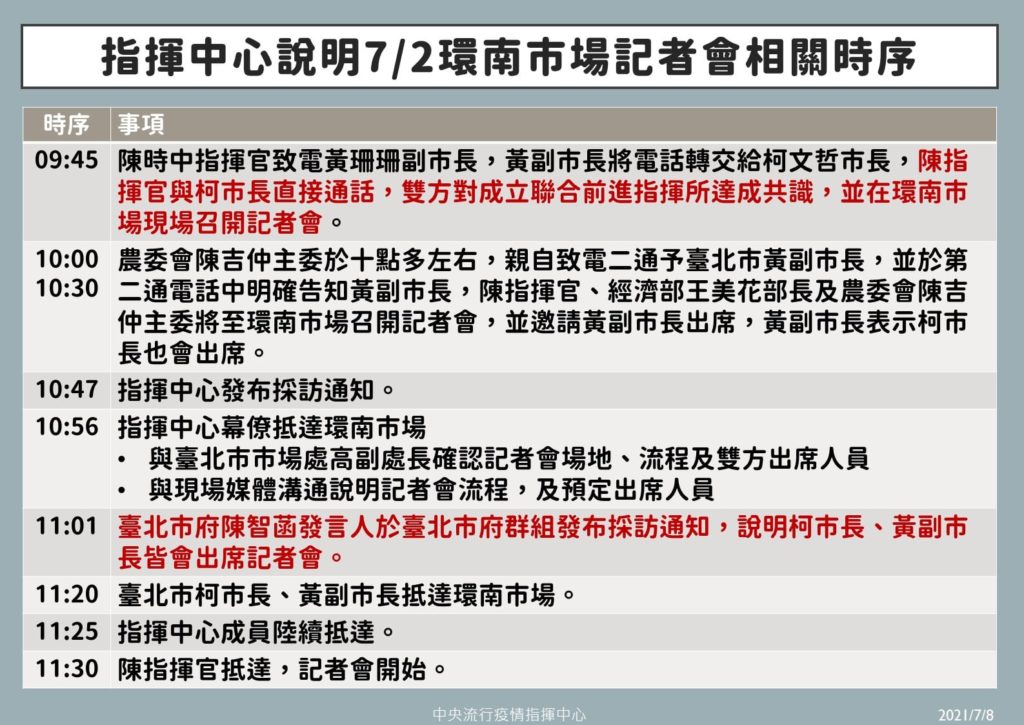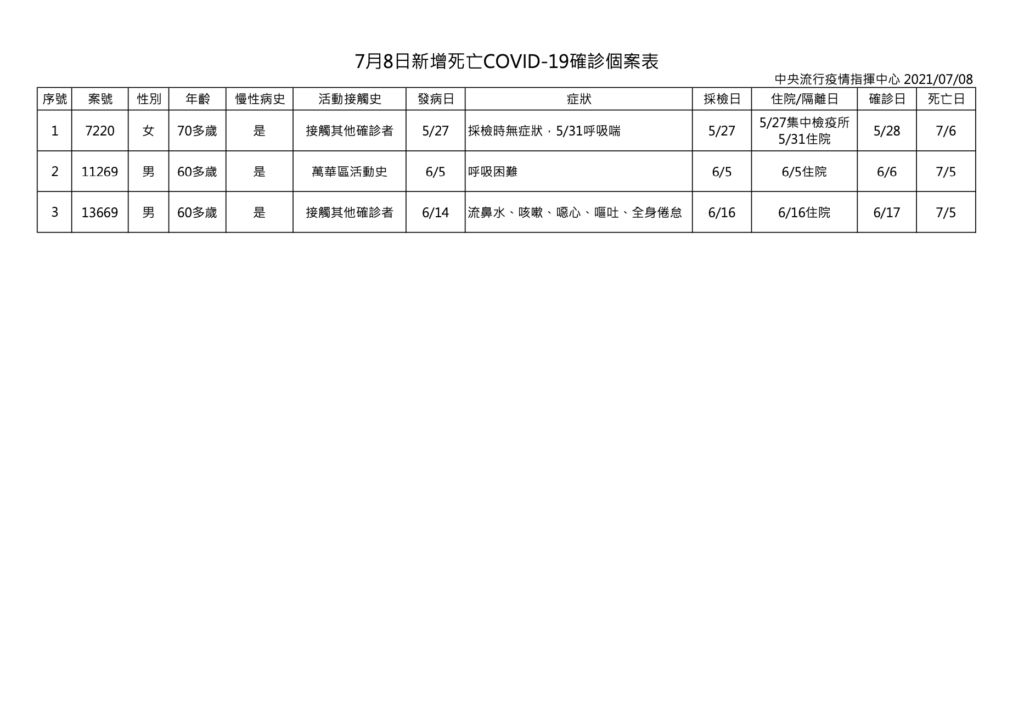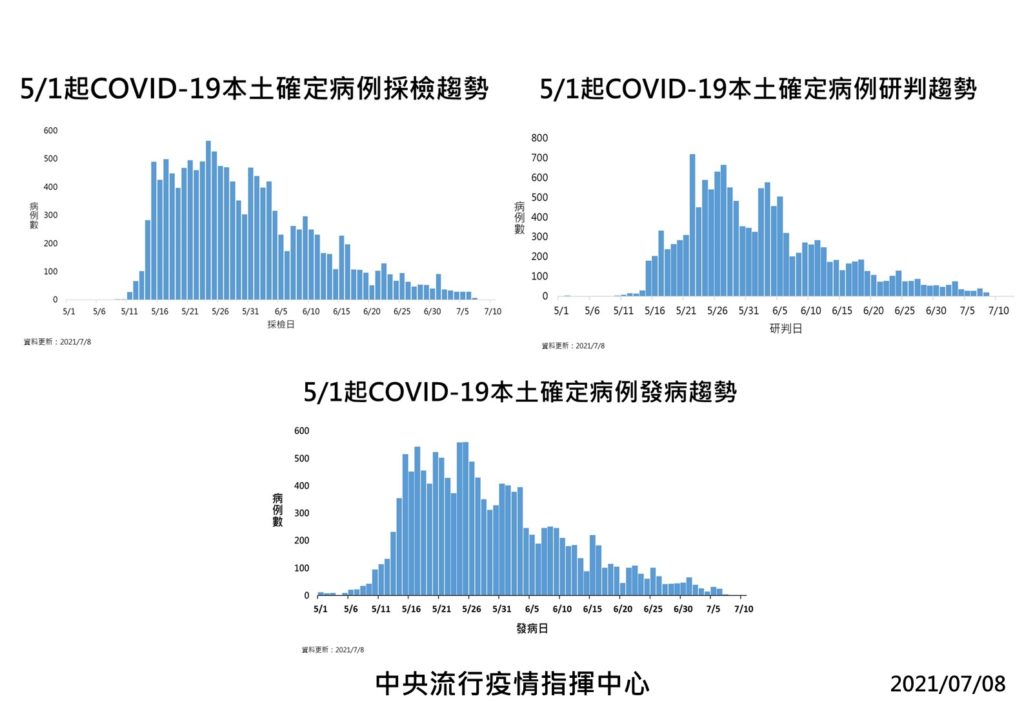by Brian Hioe
語言:
English
Photo Credit: Lord Koxinga/WikiCommons/CC
18 DOMESTIC CASES, three imported cases were reported at the Central Epidemic Command Center (CECC) daily press conference today. Three deaths were also announced.
Six cases were already in quarantine. 12 cases were in Taipei, while six cases were in New Taipei. 82.5% of cases to date have been released from quarantine.
The current level three alert will now be extended by two weeks to July 26th. However, a number of measures will be announced. It is probable that this was phased as an extension of the current level three alert and not a “strengthened” version of level two in order to maintain vigilance. To this extent, President Tsai Ing-wen is also aiming to vaccinate between 20% and 25% of the population by the end of July, with the CECC having been questioned numerous times in past weeks about whether it would require a certain percentage of the population to be vaccinated before lifting the level three alert. The new measures will take effect on July 12th and last until July 26th.
Restrictions will be maintained forbidding indoor gatherings of more than five people and ten outdoors. Likewise, the mandated wearing of masks outdoors will continue, while public establishments must continue to carry out QR code registration for visitors and provide alcohol sanitizer.
 Information on the new cases announced today. Photo credit: Ministry of Health and Welfare/Facebook
Information on the new cases announced today. Photo credit: Ministry of Health and Welfare/Facebook
Schools will maintain remote teaching. Night markets and food courts, including in department stores and on the high-speed rail, are allowed to carry out indoor dining, but social distancing measures must be maintained and barriers should be set up when possible. Set meals take priority, while eating must finish within one hour. Restaurants and eateries that reopen must carry out takeout for the first eleven days. Indoor seating is to be reduced to 50% capacity, while there will be restrictions in drinks.
Markets, restaurants, and other establishments must continue to carry out disinfection, as well as dividing up work shifts. Takeout is encouraged and vendors are called on to set up ways of paying without direct contact if possible.
If there are cases of infection, eateries will be required to close for at least three days. If the new measures lead to issues, it is possible that indoor eating will be again suspended.
Religious gatherings are primarily forbidden, but religious groups can apply to hold religious events if they are under 100 people.
Public parks and forests will be reopened, but parking will be maintained to 40% of capacity. Some parks, such as in Kenting, will remain closed. Hot springs areas in parks will remain closed, nor are water activities allowed.
Tourist swim groups are allowed to take place, though this is limited to under ten participants, including lifeguards.
Sports courts in parks will not be opened up, seeing as individuals playing sports would gather in groups, and this would lead to physical contact between players. Outdoor facilities for schools, such as tracks, will be opened up but exercise equipment at schools will not be unlocked. Swimming pools will not be reopened. Some gyms are included in the facilities allowed to reopen.
Public libraries will be opened, though people are not allowed to browse as usual, and no more than 100 are allowed within libraries, but people are allowed to take out books.
Public restrooms will be reopened, but must see strengthened disinfection. Public rest areas will also be reopened, but people are limited to visiting for one hour.
Exhibition venues and movie theaters will be allowed to reopen. For exhibitions, visitors must make reservations ahead of time, and will be brought into the exhibition venue in groups to avoid contacts. Similar measures will be carried out for movie theaters, with drinking and eating not allowed. These measures were announced due to the fact that few theaters in Taiwan can accommodate more than 100 in a single auditorium.
Performances can be held for theaters, but only by livestream and not open to the public. Performers can take off their masks, but not other workers, and they must sign a release and be PCR tested before entering the theater. Performances are not opened to the public because this involves audience members facing performers, while theaters face one direction.
CECC does not recommend opening up areas to buy oden or tea eggs in convenience stores, because there is the possibility of spreading COVID-19 through picking up food with shared utensils.
According to the CECC, the level three alert was extended because there are still some days in which there are more than ten cases in which the source of infection is unknown, one of the criteria for declaring a level three alert. Another criteria for the level three alert is more than three cluster infections in a week. There have been four consecutive days in which there have been less than ten cases with unknown sources of infection so far.
Some of the distinctive masks worn by Chen Shih-chung and other CECC officials to thank the US and Japan for vaccine donations will be put on sale in Hi-Life in the coming days. These masks have been highly popular online.
The New CB Party KTV in Ximending is closing, due to the effects of closure in the last two months. The KTV’s equipment has already been removed. The KTV, which operated 24/7 and had been open for ten years, was one of the iconic KTVs in Ximending and was usually busy through the night. The New CB Party shut down its three branches at the start of the outbreak, though the KTV has not formally publicized closure. The Eslite Xinyi branch has also experienced a hit to business and has not been granted any rent reduction from its landlord.
Taiwan continues to be short on blood. The Taoyuan-Hsinchu-Miaoli area has announced that it is experiencing the most severe blood shortage in ten years.
Information on the new deaths today (left) and further data released by the CECC (right). Photo credit: Ministry of Health and Welfare/Facebook
Hsinchu City is the first in the country to meet vaccination benchmarks for individuals over 70, with 60% coverage for those over 70 years old. The overall coverage rate is 11% and the city is on track to meet 25% vaccination by the end of the month
At New Taipei mayor Hou You-yi’s press conference today, the New Taipei government attacked the CECC. New Taipei officials claimed that the new measures were confusing and that investigation needed to be carried out into Taiwan’s comparatively high rate of death from COVID-19 and the lowering of quarantine periods for pilots that led to the current outbreak.
Taipei mayor Ko Wen-je threatened to reveal the names of staffers in the Presidential Office that have been vaccinated. This would be a way of striking back against criticisms over violations of vaccine priority order at Taipei clinics, as well as violations of vaccine priority order by pan-Blue politicians.
Controversy continues about a press conference outside the Huannan Market where legislator Freddy Lim criticized Taipei mayor Ko Wen-je’s COVID-19 response and was, in turn, criticized by the head of the Huanan market. Taipei mayor Ko Wen-je appeared yesterday on KMT central committee member Jaw Shaw-kong’s talk show to allege that the press conference was a set-up from the CECC and that he was under the impression that the press conference would be a meeting. The Taipei city government did notify journalists beforehand of the press conference, however. There has been speculation about a future political alliance between Ko and Jaw after the interview.
The CECC and Taipei city government have both sought to outline their versions of the series of events before the press conference. With local governments criticizing the rollout of Audrey Tang’s new vaccination registration system as failing to coordinate with them beforehand, the CECC also reviewed the history of meetings between CECC officials, Tang, and city mayors about the new system. Ko Wen-je stated today that he did not see any point in Taipei setting up its own system, but criticized the rollout of the system as too slow.
 Information released by the CECC about what took place prior to the Huannan Market press conference. Photo credit: Ministry of Health and Welfare/Facebook
Information released by the CECC about what took place prior to the Huannan Market press conference. Photo credit: Ministry of Health and Welfare/Facebook
Ko also asserted that the Taipei city government would review the new measures announced by the CECC and see which were feasible. This raises the possibility of local governments defying the relaxation of measures announced by the CECC, in line with how local governments sought to escalate the alert level earlier on in the outbreak, even when the CECC urged the maintaining of divisions between the different alert levels. Otherwise, Ko expressed the belief that the extension of the level three alert was due to undetected transmission chains of COVID-19.
If so, it is probable that city governments would err on the side of caution and decline to relax measures, so as to make the CECC appear to be failing to take the safety of the public in consideration. In particular, New Taipei mayor Hou You-yi was among those that strongly urged that the criteria to lift the level three alert had not been met in past days. That being said, Taipei Ko Wen-je has sometimes seemed to be in a rush to reopen the city.
Vaccinations have begun for individuals above 40 in Kinmen, with registrations taking place online. The current rate of vaccination in Kinmen is 12.4%.
43,120 people were vaccinated yesterday. 35,878 were Moderna vaccinations. 12.1% of the population has been vaccinated.
1.13 million doses of AstraZeneca vaccines donated to Taiwan by Japan are expected to arrive this afternoon. The CECC thanked Japan for its vaccine donation today.



